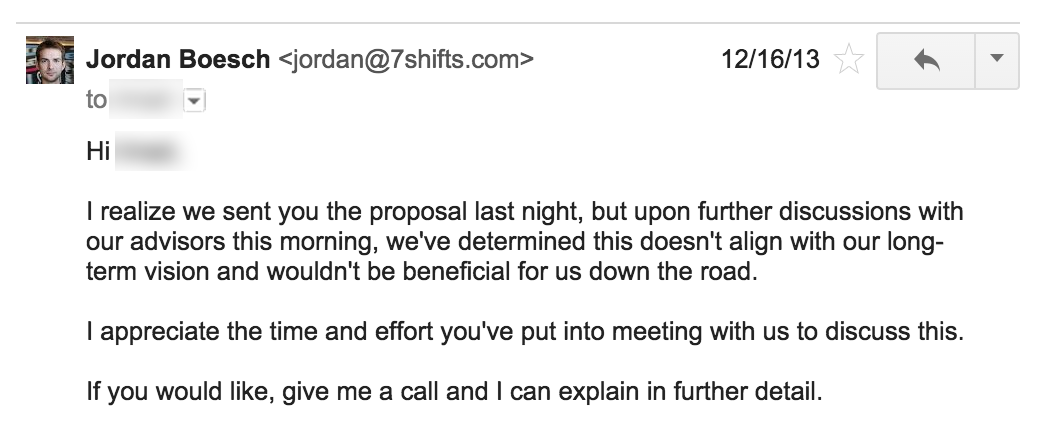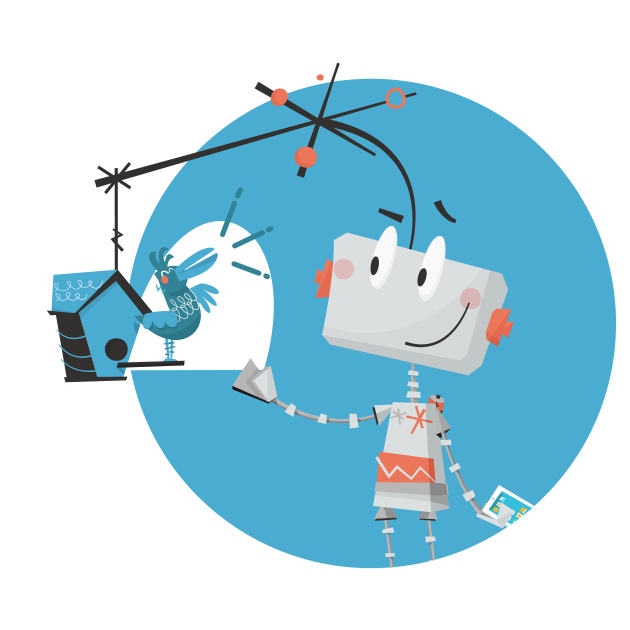Become an insider!
Get our latest payroll and small business articles sent straight to your inbox.

I’ve been extremely fortunate since starting 7shifts. We’ve managed to put together a great team, focus on building a great product for restaurants, and have learnt a lot of things along the way.
Since we first started, we’ve had our share of ups and downs. My team and I actually refer to this feeling as the “startup bipolar coaster”. When things are going well, you feel like you’re on top of the world. But when a deal falls through, you feel like you’ve lost it all and you start to question everything.
I know it’s a common emotion for a lot of founders out there, and that’s why I wanted to focus this post on a big source of our bipolar coaster over the years – partnerships. This isn’t to toot my own horn; rather, I think startup businesses should simply be cautious because it can be very time consuming and draining if it doesn’t align with your direction.
.@wagepoint A2. What do you imagine our company working on for the next 6 months? How do we fit into the bigger picture? #smallbiz_expert
— 7shifts Scheduling (@7shifts) September 28, 2015
Here’s one of our first encounters with a potential partner….
We were 2 months away from demo day at the Boost VC accelerator in San Mateo, CA when we received an email from this guy – let’s call him Bob. Bob emailed us through our support channel and said “I tried calling the 877 number on your support page without success. Looking to have a discussion about a partnership. Thanks!”
Needless to say, we were all extremely excited. As a 3 person startup, getting approached about a partnership opportunity felt like winning the lottery. I promptly followed up with him later that day and we chatted about the opportunity. They were a 100+ employee company that was interested in our scheduling software and making it a part of their offering. This turned into a follow-up phone call. During this call, it became clear that our current feature set wasn’t enough for them. They required several changes and additions to our scheduling software. A couple features were on our roadmap, but most were way out in left field and required a lot of integration with their proprietary in-house systems.
We finished the call and started talking amongst ourselves about all of their requirements and how big of a deal this could be. It all sounded like the big home run that startups only dream of. I mean, a company like Big Corp. wanting to partner with us?
We had a follow-up call a few days later to discuss next steps. Bob then went into saying that in addition to the changes they’ll require, they’ll also need us to work with them on-site to port our code over to their code base. This is where things took a turn. My gut sank as I immediately pictured being a contractor or even an employee at this company. Spending months porting code under contract with them sounded like a death sentence for our startup. Besides, the 3 of us were doing a startup because we didn’t want to be contractors building a one-off projects for a quick buck.
Through a couple of phone calls with some helpful advisors and left with my own thoughts, I decided to pull the plug on this. The decision came right after we had sent the proposal and scoped all of the work.

What started off sounding like a great opportunity, felt to be much more beneficial for Big Corp. than our startup. They wanted to pay us very little for licensing our product and we would have to spend an estimated 6+ months in-house integrating it into their system. This just didn’t seem like the type of partnership we were hoping for.
As it turns out, we found out they wanted a quick path to closing a deal with one of their enterprise clients that required a scheduling module. We were merely a tiny piece of the puzzle in their eyes, paired with the cheapest and quickest path to success. In other words, we were vulnerable and they knew it. The fact that 7shifts didn’t have a clear focus on restaurants at the time didn’t help the situation. We were a team of 3 trying to show quick growth in numbers any way we could. That’s what successful startups do, grow quick revenues, right? We were so naive. It was a waste of time and energy for something that wasn’t right from the beginning.
Since this initial incident with Big Corp., we’ve had a few other “business partnership opportunities” that were shockingly similar. We quickly eliminated them after a few phone calls when they smelled too much like the one above.
We’ve also learned a few things going through processes like this. Here’s how we vet these types of situations now:
-
Is this partner proposing something that aligns with our vision for restaurants? If it doesn’t, we ask “Why did you decide to contact us?”. If we’re putting ourselves out there as a company that focuses on restaurant employee scheduling software and someone contacts us from a truck driving company, we want to know why. Maybe they’re contacting 50 employee scheduling companies and they haven’t taken the time to really understand the differences. Maybe it’s a case of us needing to portray our company differently on our marketing site to make it more clear who our target audience is.
-
Are they wanting to make a strategic investment or white label your product? If so, is this something you’re wanting? A strategic investment could mean the investing company could drastically change the path of your company.
-
Did you feel good after your meeting? I think it’s pretty crucial to listen to your gut as well. Don’t ignore the feeling of something not sitting right. Talk to your team to try to get to the bottom of it.
All in all, we’ve learned not to be in denial as to where our company is at. At the time, we were small and that’s fine. That’s where it all begins, but I would recommend taking that time to really find your fit in the market and try not to get too distracted by companies that are 20x your size looking to partner.
.@wagepoint A4.2: It’s important to consider where the company is at: revenues, growth etc. #smallbiz_expert
— 7shifts Scheduling (@7shifts) September 28, 2015
In our experience, they’re not looking for a partnership, they’re looking to make a strategic investment where they call the shots, or to acquire your team and/or product. For further reading into this, I recommend reading Paul Graham’s post about Corp Dev and also James Cohane’s article on “When (Almost) Every Company Should Invest in Biz Dev”.
Stay peachy!
 Get the entire story in our #smallbiz_expert Twitter interview w/ Jordan!
Get the entire story in our #smallbiz_expert Twitter interview w/ Jordan!
This blog post is brought to you by Jordan Boesch, CEO and Co-Founder of 7Shifts, an employee scheduling app for restaurants. Sign up today and get your first 2-months for free via the Wagepoint Marketplace.










